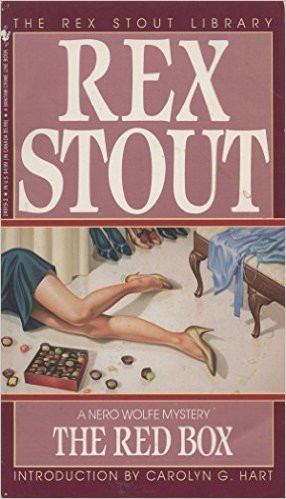A couple of weeks ago I wrote about the detective story as a playground for exploring the philosophical question of double effect. This week I thought I would discuss an excellent example in this category – The Red Box by Rex Stout.
Unfortunately there is no easy way to discuss the ethical dilemma without spoiling the story so beware.
At the center of the story is the Frost family and the vast Frost fortune. The Frost family consists of two major branches. On one side is Llewellyn Frost, a shallow young man who produces flop plays on Broadway and his father Dudley, who is a babbling, blowhard. Neither has much more than their bluster to their name. On the other side is Helen Frost, Dudley’s niece and the heiress to Dudley’s brother’s immense fortune, and her mother, Calida Frost, Dudley’s sister-in-law.
Caught in the orbit of the Frosts are a wide variety of people, the two keys being Boyden McNair and Perren Gebert. McNair is a successful designer of women’s clothing and he own a fashionable boutique in lower Manhattan where Helen works as a fashion model. Perren Gebert is a useless dandy who is an old friend of Calida Frost and a would-be suitor for Helen. Unlike McNair, Gebert has no visible means of support.
The story starts with Llewellyn Frost bullying the famous literary detective Nero Wolfe into investigating the death of Molly Lauck, a fashion model in McNair’s boutique. About a week earlier, between runway calls, Molly, Helen, and a third girl by the name of Thelma Mitchell, snuck away to a deserted spot to rest. Molly produces a box of candy that she ‘swiped’ for them to have a snack. One poisoned Jordan almond later and Molly is no more. Llewellyn’s aim is for Wolfe to find Molly’s killer as a way of pulling Helen away from her job at Boden McNair’s shop thus opening a door for Llewellyn to rid himself of a McNair as a perceived rival for Helen’s affection. It seems that Llewellyn is so smitten with his cousin that he has researched whether it would be licit for them to marry.
As Wolfe investigates he finds that the box of poisoned candy was intended for Boyden McNair. McNair, recognizing his peril begins to put his affairs in order and even goes so far as to name Wolfe in his will as the executor of his estate. Shortly afterwards, Boyden McNair visits Wolfe’s office to explain the situation and to ask Wolfe to consent to the arrangement. Boyden hints that the danger to him is rooted long ago in the past around the time of the birth of his daughter Glenna, who was born a month before Helen Frost. McNair explains how his wife died during childbirth and how Glenna was lost to him a few months later. He goes on to tell Wolfe that should he die all the proof Wolfe needs can be found in his red box. Unfortunately, just before McNair reveals where the box is hidden he also dies from poison, this time expertly put into a bottle of aspirin that he carried around.
With no other obvious recourse, Wolfe sets his agents to the task of finding McNair’s red box. The New York police are also eager to find the box as are the Frosts. Indeed, everyone is so anxious to see what truth lies in the red box, that the box itself begins to take on a life of its own.
Meanwhile, Perren Gebbert begins to push hard for the hand of Helen in marriage. He even goes so far as to try to find the red box for himself, which is quite remarkable considering his layabout status. He is rewarded for his effort by becoming the third victim of the poisoner.
With three deaths on hand and no red box, Wolfe resorts to a clever plan. Realizing that the red box has now become an incredibly powerful psychological symbol, he pays an artisan to manufacture a faux red box. He then gathers the suspects and begins to reveal the truth all the while with the counterfeit red box in plain view.
The truth he reveals is this. The real Helen frost died those many years ago. Being penniless and a recent widow, Boyden McNair agrees to allow Calida Frost to raise Glenna as Helen. Calida is the one who suggests this arrangement because secretly she sees it as a way of keeping control of the vast Frost fortune – a fortune that she was disinherited from due to her marital infidelity years earlier. Gebbert, who was witness to the switch, offered his silence in return for a monthly stipend from Calida. Having identified the motive for the murders, Wolfe has revealed Calida as the culprit and convincingly hoodwinked the gathering into believing that all of this is supported by the evidence he found in the red box.
However, Wolfe really has no tangible evidence as he has never been able to locate the red box. To keep hi gambit alive, he hands the red box to Calida. Upon opening it, she finds a bottle of oil of the bitter almond, a potent poison. Believing herself to be trapped, she quickly swallows the poison and kills herself.
And here we have the ethical conundrum of double effect: was Wolfe justified into cornering Calida Frost into committing suicide?
While there is no easy answer to this question, I would argue that he was. To support this, let’s look that the four conditions that must be met for the application of double effect, starting with the easiest and progressing to the hardest.
The agent must intend good. This point is the easiest and most supported of the four. Wolfe gained in no way, neither financially, personally, nor professionally by the death of Calida Frost. She posed no threat to him physically. Using the fake red box as a prop actually resulted in less growth in his professional reputation than would have occurred if all concerned knew that he had deduced the story merely by the scattered bits of clues that had emerged since Molly Lauck’s death.
The end must be an immediate consequence and not a means to some other end. This point is also fairly easy to support. The end was putting an end to the reign of terror brought on by a murdered. That end was achieved by the death of the murderer as an immediate consequence of presenting the poison to Calida Frost.
The good must outweigh the bad. This point is a bit trickier to affirm in Wolfe’s favor. Clearly taking a murderer off the street, in particular, one so cunning and sneaky as to have killed three people by poison, is a good thing. And considering that the period in which this story was set also had mandatory capital punishment, it seems that this should be straightforward. But the people of the city of New York was the only proper authority to administering this type of justice. By circumventing their proper role and becoming, in essence, a vigilante, Wolfe has visited some bad on the justice as a whole. Nonetheless, I believe that the good outweighs the bad in this case.
The action must be good or at least morally neutral. Here is the most difficult point to justify. Is offering poison to anyone with the intention of them drinking and thereby dying ever a good thing. This point clearly dovetails with the one listed just above but it differs in a subtle way. In the question about the good outweighing the bad, the central notion was the good and bad done to society. Here the central question seems to be the intrinsic question about the violence Wolfe may have done to his own soul. It was a hard choice and while I understand why Wolfe made the choice he did, I still have a hard time becoming comfortable with this way of stopping a killer. Nonetheless, I think when all things are considered, Wolfe’s actions were supportable by the doctrine of double effect – I just don’t think I could have done it were I in his shoes.

